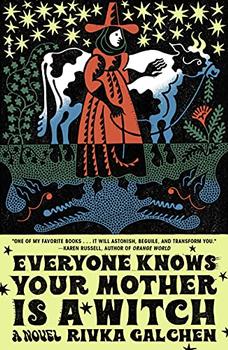Book Club Discussion Questions
In a book club? Subscribe to our Book Club Newsletter and get our best book club books of 2025!
For supplemental discussion material see our Beyond the Book article, Johannes Kepler (1571-1630) and our BookBrowse Review of Everyone Knows Your Mother Is a Witch.
Please be aware that this discussion guide will contain spoilers!
- Discuss the author's choice of the book's narrators. We alternate between Katharina Kepler's voice
as transcribed by her neighbor Simon, Simon himself, and then testimony and letters from accusers
or advocates of Katharina. How might using multiple narrators be more revealing than using a
single narrator? What color makes it in, what nuance, or what intimacy?
- Rumors are central to Everyone Knows Your Mother Is a Witch. Describe some of the rumors that
affect Katharina Kepler throughout the novel. Are there any that you found particularly insidious?
Which ones, and why? How and why do the rumors start? Describe how they take new forms as
Katharina's story progresses. Were you surprised by the life some of the rumors took on? What
does the evolution of the rumors suggest about the beliefs of Katharina's peers? When and why
might they choose to believe rumors rather than what is easily provable?
- How would you describe Katharina and her alleged crimes? Did you find her trial irritating, cruel,
or something else? Do you feel she made herself a target, perhaps by meddling, even if she meant
well? Even Simon "acknowledges her intrusive nature," although he admits it has a "resplendent
underside" (page 44).
- What is Katharina's influence on those around her, and especially on someone vulnerable like
Anna, Simon's daughter? Does she help those around her to live bolder lives? What does she
perceive her influence to be, and is there a disconnect?
- How would you describe the relationship between Katharina and Simon? How does it grow and
evolve as seasons pass? What feelings are too dangerous to say out loud, especially as her trial
progresses?
- Who is Ursula the Werewolf? What is her connection to Katharina, and how have their paths
intersected? Is there more to their story besides a frayed friendship? What is she after?
- Does Katharina possess any true power besides her obvious knowledge and skillful use of herbal
medicine? How does this and her "quiet knowledge" (page 160) put her in the crosshairs? What
dangers does she pose, and to whom?
- Did you suspect Katharina's connection to the classical astronomer Johannes Kepler, and if
so, when? Does knowing that the story is informed by substantial history add to your reading
experience? Were you inspired to learn more about Johannes Kepler's work? How is he connected
to the title of the book?
- "Luther said that even if the earth were to end tomorrow, he would still plant his tree" (page 211).
Discuss the role of Martin Luther's theology in reshaping attitudes on faith. How radical were his
ideas? What are their ripple effects on the book's characters? What does this quote above mean to
you?
- "I was sitting in a church pew, and at the pulpit was the devil" (page 126). Why does Katharina insist on justice, even though so much is at stake? What are her options after she is accused
of witchcraft? Why does she return to the town where her accusers have better access to her?
Discuss and share how you might have resisted—or relented.
- "I understood her—to love others is to suffer" (page 184). Can you sympathize with the depths
of Katharina's losses? With her love, her hard-won wisdom, and her sacrifice? "I've tried songs
about sunshine, also prayers, I've tried every kind of blessing ... I've even cursed and begged.
Again, who hasn't?" (page 161). What seems to give her solace or help her persevere—or at
least keep the rage from taking over?
- Think about some modern parallels in relation to Katharina's behavior. What is universal and
true about being a mother, or a mother-in-law? Did you find her relatable regardless of her
being a product of her time?
- Describe the dynamics between Katharina's children. How do her adult children rally
together—or not? How different are their approaches to their mother's predicament, and what
manifests from the stress?
- Discuss Katharina and Chamomile's bond. What lies in the space between what is said and
unsaid? How does Katharina care for her? How does Chamomile get her name?
- "It is a common misconception that all children are beautiful and full of spirit. They aren't.
Some are fearful, or aggressive, or aloof, or selfish. Some are wonderful but unreachable and
private. I have known and cared for and loved many small people" (page 92). Discuss your
feelings on this sentiment. How is Katharina inseparable from Maruschl? How would you
describe their connection?
- What feelings did you have at the end of the novel? Were you relieved, dismayed, or
overwhelmed by the way Katharina's story ended? What did you hope for her?
Unless otherwise stated, this discussion guide is reprinted with the permission of Picador.
Any page references refer to a USA edition of the book, usually the trade paperback version, and may vary in other editions.
